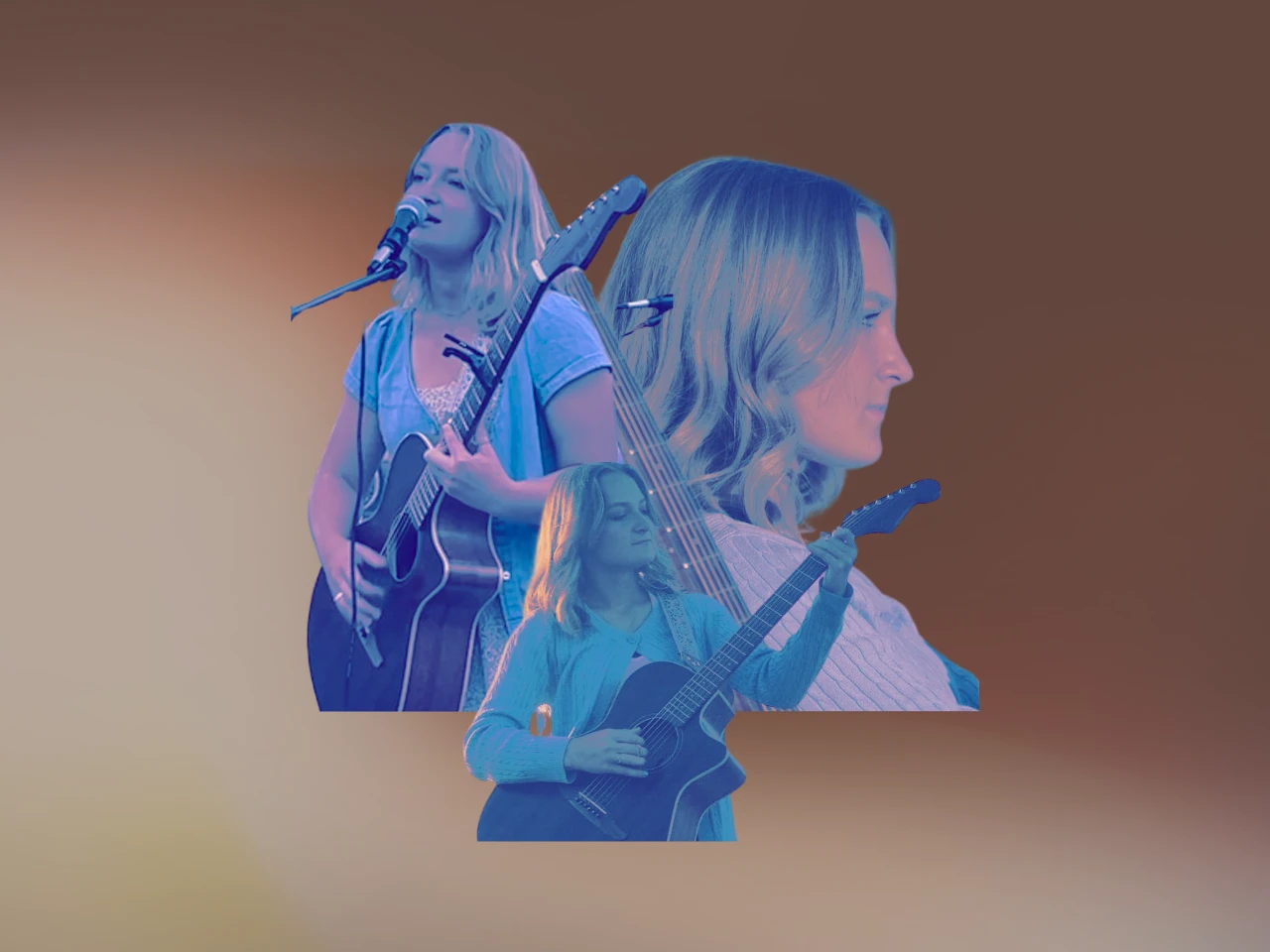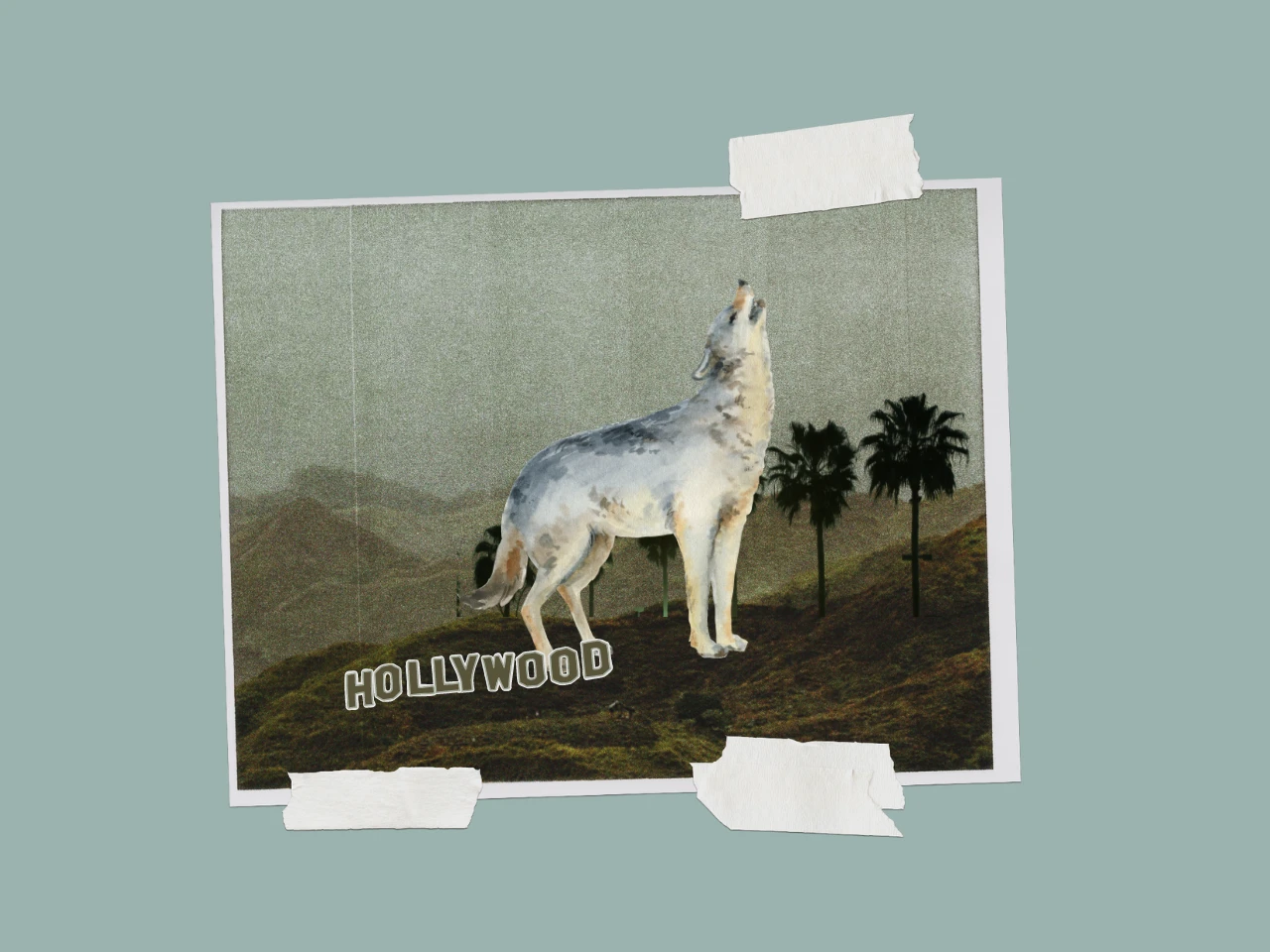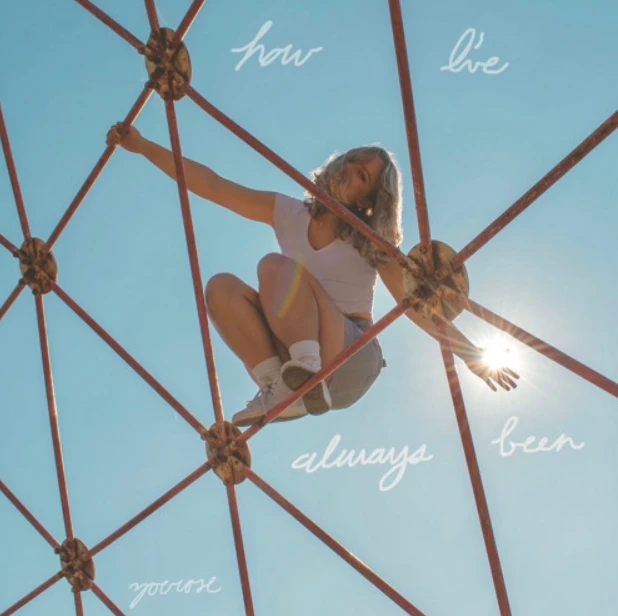
Listening to zoerose this early on feels almost like discovering her. In her debut, she already has the voice of an artist that commands attention, with a bright sound that spins beauty from regret. Her debut album how i’ve always been holds 13 songs that were written, recorded, and produced solo, with the talent needed to pin the distinctly ephemeral down into music.
In zoerose’s soundspace, we find that regret is tempered by the music itself, as she explores not only the emotions she has, but the emotions she’s meant to have. The production of the album lends a gentle haze over the more cynical lyrics, adding to the dissociative narrative that runs throughout. There’s vocal layering and a distinctly fingerpicked guitar which strongly feature as the album progresses, even as her title track leans into soft rock— a glowing highlight among many strong songs. These songs approach attachment without fully succumbing to it, as zoerose adjusts the scope of her narrative between verses. It lends a kind of resonance other debuting singer-songwriters often lack, allowing the listener to engage with her world thematically without expecting them to invest in the minutia.
Maybe the most compelling example of her vision as a musician comes with ‘leather’, a track sampling her grandfather telling a story, framed gently in guitar and faded out as if to not disturb the moment within. A great deal of the album shows her looking at her world through cellophane, and she works well in the haze. In this ethereal debut, zoerose is always looking at something just out of reach.
This spring, she sat down with Flat Ink to discuss her writing process, her inspiration, and her future in music.
Before ‘how i’ve always been’, you released ‘voice memos’, three singles of which only one would go on to feature on the album. Did you know you were writing an album at the time? How did you decide which songs make the cut?
I didn’t write the album with the intention of writing an album. Instead, I wrote each song individually over the past three years. After having written close to a hundred originals, I thought it was about time I did something with them! I went through my song journal, listened to all my past demos, and scanned through my voice memo recordings. I then pieced together a list of songs that met my expectations. As my first album, I wanted to display the highlights of my work throughout the years, and I feel that I did exactly that.
I was very interested in your ‘inspiration’ playlist. It’s absolutely massive and contains artists like Leith Ross, Phoebe Bridgers, Bob Dylan, and Adrianne Lenker. Are there any songs or albums you feel your album is in conversation with? Or alternatively— what were you listening to while making it?
I draw a lot of inspiration from other artists. I’ve learned and grown by listening to their structure and their methods of storytelling so that I can better convey my own stories. Artists like Adrianne Lenker and Leith Ross have incredibly genuine lyrics. This type of songwriting is what I strive toward, as it’s truly the best way to engage and connect with my listeners. I think my main goal with each musical project is to leave an impact on the people that listen to it; to have them feel what I felt when writing them. What is music if it doesn’t make you feel something?
Interestingly, a lot of your songs recount silences. In ‘close your eyes’, it’s ‘didn’t try to begin / didn’t bother to ask you’. In ‘day by day’, it’s ‘never could say’. In ‘a different kind’ it’s ‘can’t look in the eyes’, and so on. Do writing these experiences change them for you in any way? In that vein, would you consider yourself a ‘confessional’ songwriter?
Writing confessionally is all part of the healing process for me. It pushes me to reflect on my weaknesses, my fears, and my tendencies. I’ve noticed I am not one for confrontation. The songs you mentioned each recount a moment where this weakness prevented me from growing, and how I wish I had taken the chance. Being honest in my music is so important to me - without it, there wouldn’t be enough intimacy or emotion in my songs to connect with those that listen to them.
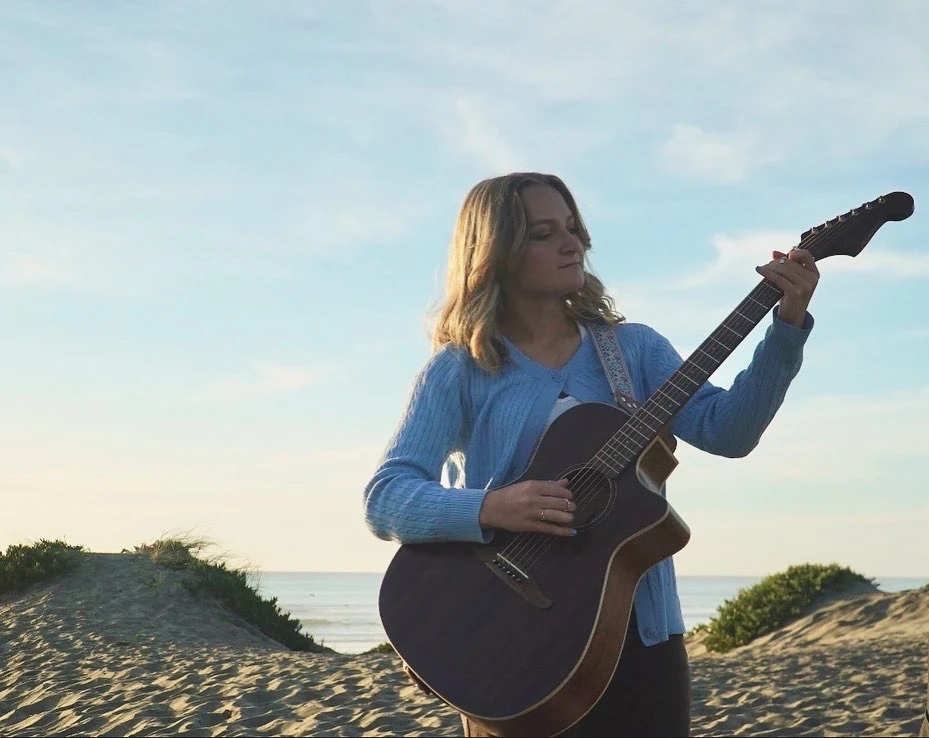
The opening track ‘introduction’ layers upon itself perfectly and really invites the listener into your soundscape. It’s also a wonderful demonstration of your work as sole composer. What was producing this album like for you?
There were a lot of ups and downs. Believe it or not, the majority of the album was produced on the GarageBand app on my dad’s old iPad with a pair of standard wired earbuds. It wasn’t until this past year that I gained access to professional digital audio workstations, like Logic Pro and Ableton Live. The songs I wrote most recently, ‘parachute,’ ‘how i’ve always been,’ and ‘when it rains in california,’ were all mixed and mastered using the nicer equipment provided at my university. Even though producing the album myself was a little strenuous, it allowed me the creative freedom and as much time as I needed to be picky with my choices. Eventually, I’d like to work with a producer to obtain a cleaner sound, but I didn’t mind having complete control over how each song felt and sounded. I was aiming for my sound to feel warm and nostalgic. I’m still working on developing and improving the cohesiveness of my sound, which will come with time.
The song ‘parachute’ looks back at a past relationship, ‘close my eyes’ recounts the beginnings of an infatuation to a current bittersweet hindsight. ‘day by day’ describes a settled yet tentative relationship. ‘cartoons!’, a highlight of the album, describes an innocent love that becomes entangled in memories. Most of the album depicts these in-between relationships. Is there a singular narrative thread, or would you consider these to be more anthologized moments?
Each song is about a specific person that has significantly impacted me. However, very few of them are about the same person. I wrote these songs in various places in my life. Naturally, people come and go and mark the beginning or end of a new phase. In a way, the album narrates my growth and discovery with each person that I crossed paths with over the years.
When piecing together the list of songs I would include in the album, I noticed that every track portrayed either a beginning or an end. Whether it was the start or the end of a relationship, friendship, or a phase in my life, ‘how i’ve always been’ is all about transitions.
In both ‘daisy may’ and ‘leather’, there’s outside samples featured in the tracks. What did you sample and why?
I decided to be vulnerable when writing ‘daisy may.’ I’ve always struggled with body image and have a rocky relationship with food. Unfortunately, this issue is familiar to a lot of women. Always having to conform to the beauty standard and the male gaze becomes exhausting. This narrative has changed over the years, hence why I dove into how beauty standards were viewed in the past. I stumbled upon a 1960s infomercial titled “How to be Attractive - A Guide For College Girls.” I expected to watch some shallow tutorial, detailing how to please the male gaze, how to be skinny, or how to dress “correctly”. Instead, I found that it left a powerful message and stated, “your inner beauty is your most beautiful, powerful possession.” This stuck with me. I didn’t expect this level of body positivity to be promoted well over 50 years ago. I instantly knew I had to include that in my track, to provide an encouraging note to end on.
‘leather’ is one of my favorite tracks for several reasons. Growing up, my grandpa was one of my biggest supporters. He went to nearly every musical and band concert and always encouraged my academics. In recent years, he developed health problems, including vascular dementia. As his disease quickly progressed, I began recording the conversations I had with him, knowing they would be some of our last. In ‘leather,’ I inserted a recording of him recalling one of his stories from his travels in Europe. It just so happened to be one of the last coherent conversations my family and I had with him. Including a piece of him in the album was a must. He passed Christmas Eve of 2022 and I miss him every day.
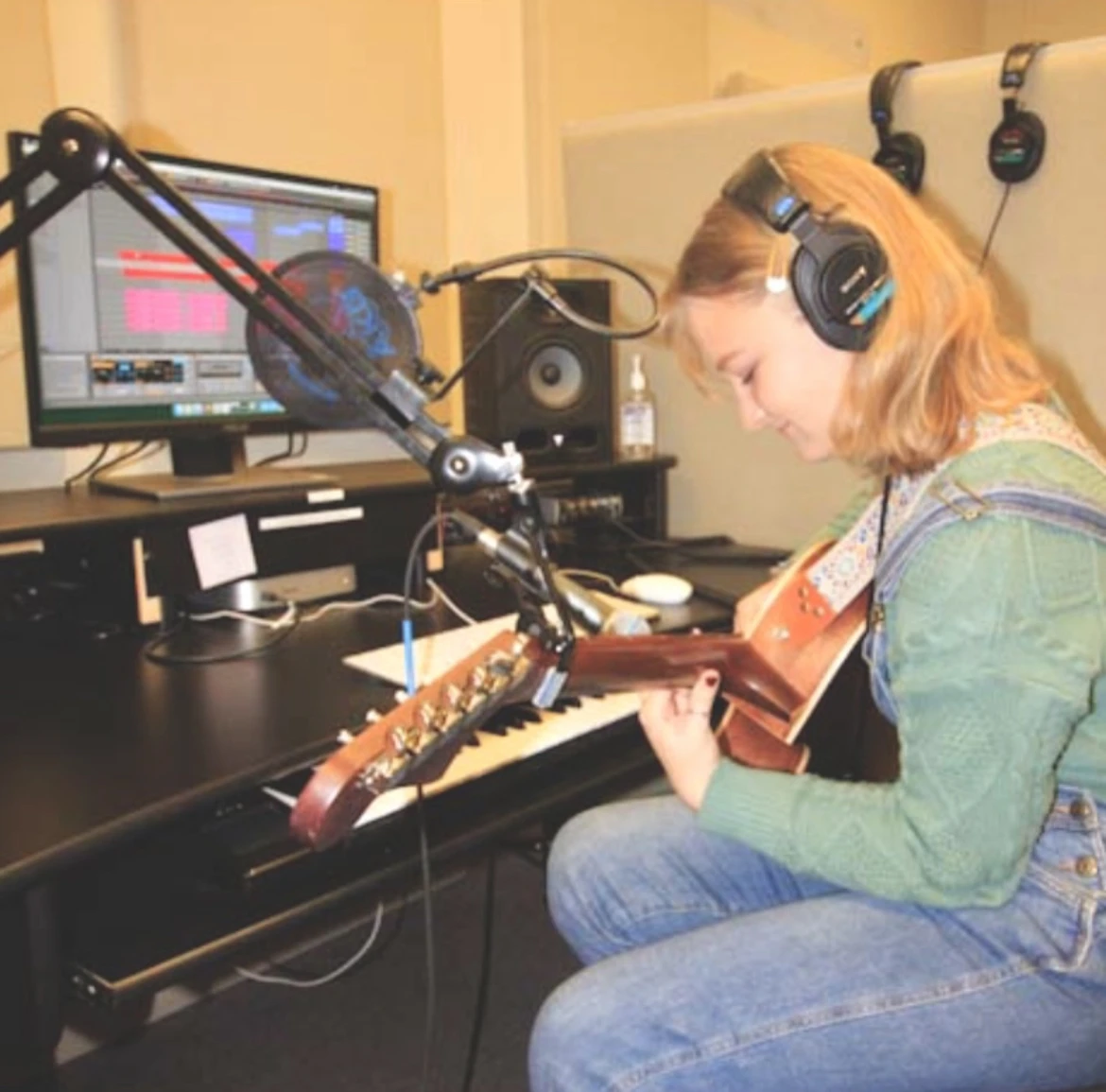
The frequent vocal layering in the songs is a highlight throughout and really showcases your skill as a singer, specifically the training it must take to have gotten to this point. I wanted to ask a bit more about your background in singing and music as a whole. Where did you first start singing and learning music? When did you figure out you wanted to pursue this professionally?
Growing up, my mom signed me up for every extracurricular imaginable. It wasn’t until I tried concert band, choir, and musical theatre that something stuck for me. I felt like I had finally found where I was meant to be. With the combination of vocal technique, acting, and percussion/marching drums, I felt efficient in singing and rhythm/music theory.
It wasn’t until high school that I started exploring writing my own music, and to pass the time during the pandemic, I borrowed my friend’s guitar. It instantly clicked and to this day, guitar continues to be one of my favorite tools for songwriting. There’s something about the variety of rhythms and tunings that opens the door to infinite possibilities. When I’m creating music, I could be writing for hours, but to me, it feels like only minutes. It’s so healing to write - pursuing this professionally would be the ultimate goal.
I would be remiss if I didn’t ask you about your guitar playing. From a theory perspective, how do you approach writing the guitar parts for a song?
I could pretend that I deeply analyzed each melody and chord progression, but to be honest, I just played around on the guitar until I found something that I liked the sound of. To me, it’s all about messing around, tweaking, and finding what feels right. In classical music, sticking to theory is more important, but my writing style is much looser and casual.
Along that line– how do you begin writing your songs? What comes first— lyrics, melody, a general feeling?
There isn’t an order I abide by. If I hear a phrase or word I like, I’ll write it down in my notes app or journal to revisit later. When it comes to melodies, I’ll fiddle around on the guitar for a while until I come to a progression or a line that I think is different or stands out. Writing is like meditation to me, so there isn’t much structure, it’s all about feeling and listening.
There’s these really neat experimental aspects throughout the album— ‘daisy may’s outro, the entirety of ‘leather’, the panning on ‘how i’ve always been’, and all these different instances in which you double back on yourself and play around. You seem really comfortable in your own sound, which is impressive for a debut. What was the process like of going from more standard songwriting to experimenting with form? Do you feel that your songwriting process evolved through making these?
Recently, I’ve expanded my music taste. I used to only stick to indie pop and classic rock, both of which lean on a more uniform structure. The more I listen to Neo Soul, Funk, and Alternative, the more I realize that there doesn’t have to be a set-in-stone structure. Instead, I can have the structure be anything I feel is right. Listening to experimental music like this has helped me realize how much freedom I actually have when writing my own originals. The “verse-chorus-verse-chorus” structure is only a suggestion.
Your song ‘a different kind’ is my favorite from the album. There’s a nearly regretful apathy in ‘I’m looking at the people passing by’, and the tension that stems from being emotionally unavailable. You’re able to weave three characters within the song skillfully, and the resolution that comes from ‘it’s all a waste of time’ perfectly encapsulates the emotions in the song. What would you consider to be your personal favorite?
Now that I think of it, I don’t think I have one! Choosing to include them in my album already makes them some of my favorites of the songs I’ve written. So, if they weren’t my favorites, they wouldn’t have been in the album.
The title track is well deserved, and ‘how i’ve always been’ is truly the pinnacle of the work thematically. Where your other songs are defined in relation to others, you sing ‘no need to call me pretty / I’m not listening’, a resolution to much of the earlier songs. The vocal layering here sounds almost like we’re listening to many versions of you at once, past and present. With lines like ‘Approach me / but tread carefully’, it’s almost reminiscent of Fleetwood Mac in its mysterious atmosphere, distinct riffs, and use of drums. It’s really a feat. What was the inspiration behind it? How did you know it was the title track?
First of all, to be compared to the works of Fleetwood Mac is high praise! I’m truly flattered. Funny enough, I wrote and recorded this track less than a week before I submitted the album for release. I had an entirely different name and cover art for the album, but it just didn’t feel right. The album was lacking something. When I wrote this song, I had a moment of both confidence and self-discovery. As a grade-A people pleaser, I’ve had some trouble prioritizing my own opinions and needs. This track is all about overcoming this mental obstacle and gaining the ability to make choices freely and listen to what I want for myself. Placing this as the title track naturally envelopes the whole album in it’s theme of newly embraced confidence. This was also in the hopes of having this album release mark a new era for myself; an end of hesitance.
What was ordering the tracklist like? Was there a certain effect or progression you wanted the listener to pick up on?
There were maybe a dozen different versions of the tracklist. I think it came down to providing a contrasting feeling between the current song and the song that followed. For example, I sandwiched a more upbeat song (‘day by day’) between two melancholy tracks (‘the realness of this’ and ‘a different kind’). This way, the person listening is less likely to feel too stuck in one emotion.
Does listening to the songs make them different in retrospect?
When writing and producing the songs, I seriously have no idea how good or bad they are. I always have to take a break from listening to it for a few days before I revisit and decide if it’s worth my time. Oddly enough, every time I listen to one of my songs is a different experience. Each time I’ll pick up something new in the mix, good or bad. It could be a vocal inflection or level of reverb that adds the right amount of airiness. On the other hand, I could notice a choppy cut of an audio file or that a whole track is over-compressed. Taking time to reset allows me to listen back with fresh ears, which is crucial to finding what to keep and what to change.
Just for fun— if you had to open for any artist that’s touring now or in the next few years, who would it be?
Opening for Searows or Lizzy McAlpine would be wild! I’ve looked up to both of them for years, and there’s not a single song of theirs that I haven’t fallen in love with. To work with them would be a game changer.
What are you hoping to do musically in the next couple of years? What does your ideal career in music look like?
In a perfect world, I would write and produce music professionally. I am just as encapsulated by the therapeutic effects of music, so I would love to go into the practice of music therapy as well. Releasing music is one thing, but helping others use music to process and embrace their emotions is powerful. Music has gotten me through some rough times, and to share that coping skill with others would be the long-term goal.
Listen to zoerose's debut album here:
Interview & Editorial Art by Dilara Sümbül

